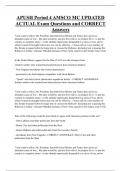APUSH Period 4 AMSCO MC UPDATED
ACTUAL Exam Questions and CORRECT
Answers
"I am ready to allow, Mr. President, that both Great Britain and France have given us
abundant cause of war... My plan would be, and my first wish is, to prepare for it - to put the
country in complete armor - in the attitude imperiously demanded in a crisis of war, and to
which it must be brought before any war can be effective... I must call on every member of
this Senate to pause before he leaps into or crosses the Rubicon- declaring war is passing the
Rubicon in reality." (Senator Obadiah German of New York, speech in the Senate, June 1812)
In the United States, support for the War of 1812 was the strongest from
-frontier settlers who wanted land and protection from American Indians
- New England merchants who feared impressment
- protestants who had religious sympathies with Great Britain
- "Quids" who held classic democratic-republican beliefs - CORRECT ANSWER✔✔-
frontier settlers who wanted land and protection from American Indians
"I am ready to allow, Mr. President, that both Great Britain and France have given us
abundant cause of war... My plan would be, and my first wish is, to prepare for it - to put the
country in complete armor - in the attitude imperiously demanded in a crisis of war, and to
which it must be brought before any war can be effective... I must call on every member of
this Senate to pause before he leaps into or crosses the Rubicon- declaring war is passing the
Rubicon in reality." (Senator Obadiah German of New York, speech in the Senate, June 1812)
Who of the following would be most likely to agree with German's position on the war?
- John Calhoun and other politicians from the South
- Henry Clay and other politicians from the West
- James Madison and other politicians from the executive branch
- merchants from New England - CORRECT ANSWER✔✔- Henry Clay and other
politicians from the West
"I am ready to allow, Mr. President, that both Great Britain and France have given us
abundant cause of war... My plan would be, and my first wish is, to prepare for it - to put the
country in complete armor - in the attitude imperiously demanded in a crisis of war, and to
, which it must be brought before any war can be effective... I must call on every member of
this Senate to pause before he leaps into or crosses the Rubicon- declaring war is passing the
Rubicon in reality." (Senator Obadiah German of New York, speech in the Senate, June 1812)
Which of the following is the best support for German's claim that the United States has
"abundant cause for war"?
- the impressment of U.S. sailors
- the controversy over the Louisiana Purchase
- the actions by the Barbary pirates
- the findings of the Lewis and Clark expedition - CORRECT ANSWER✔✔- the
impressment of U.S. sailors
"All, too, bear in mind this sacred principle, that though the will of the majority is in all cases
to prevail, that will be rightful must be reasonable; that the minority possess their equal
rights; which equal law must protect, and to violate would be oppression.
"We have called by different names brethren of the same principle. We are all Republicans,
we are all Federalists. If there be any among us who would wish to dissolve this union or to
change its republican form, let them stand undisturbed as monuments of the safety with
which error or opinion may be tolerated where reason is left free to combat it...
"Equal and exact justice to all men, of whatever state or persuasion, religious or political;
peace, commerce, and honest friendship with all nations, entailing alliances with none."
(Thomas Jefferson, First Inaugural Address, 1801)
Which of the following described a policy of Jefferson's that reflects the at - CORRECT
ANSWER✔✔- He attempted to gain trust of Federalists by continuing the national bank.
"All, too, bear in mind this sacred principle, that though the will of the majority is in all cases
to prevail, that will be rightful must be reasonable; that the minority possess their equal
rights; which equal law must protect, and to violate would be oppression.
"We have called by different names brethren of the same principle. We are all Republicans,
we are all Federalists. If there be any among us who would wish to dissolve this union or to
change its republican form, let them stand undisturbed as monuments of the safety with
which error or opinion may be tolerated where reason is left free to combat it...
"Equal and exact justice to all men, of whatever state or persuasion, religious or political;
peace, commerce, and honest friendship with all nations, entailing alliances with none."
(Thomas Jefferson, First Inaugural Address, 1801)




